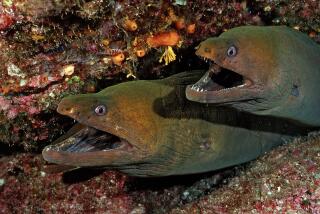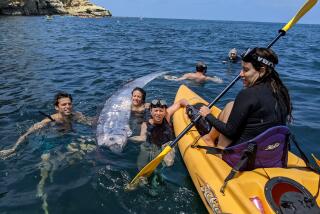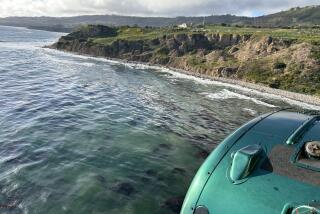Albatross wanders into L.A.
- Share via
Call it the case of the stowaway seabird.
A man driving through Los Angeles was alerted Friday to an enormous bird that had hitched a ride in the back of his pickup truck. With its white body, black wings and curved yellow beak, it might have been mistaken for a super-sized sea gull.
But the bird, it turns out, was thousands of miles from home.
It was a Laysan albatross, a seabird with an impressive 7-foot wingspan that normally nests on remote islands and atolls in the North Pacific Ocean.
International Bird Rescue took custody of the bird after the driver handed it over to lifeguards at Cabrillo Beach. The group held the albatross for four days at its wildlife rescue center in San Pedro before giving it a clean bill of health.
On Tuesday the bird was released from a boat off San Pedro to set off on a flight back home to Hawaii or beyond.
But how did an albatross get to Los Angeles in the first place?
Rescuers have a pretty good idea.
They suspect that the bird stowed away on a cargo ship, hitching a trans-Pacific ride to Los Angeles before disembarking and hopping into the pickup.
The seabirds are adept at soaring long distances and can spend years roaming vast areas of the ocean without ever touching land. They can also mistake the flat surface of a passing container ship for a nesting island, make a landing and sit there unnoticed until the ship makes port.
But even with their tendencies as wayfarers, albatrosses are rarely seen in California.
The wildlife rescue center in San Pedro has taken in a few of them over the last decade, usually when the crew of a cargo ship finds one on board and cares for it until coming ashore.
In 1979, a Laysan albatross was found wandering the streets of San Francisco, some of its feathers removed and its wings clipped. The bird, nicknamed Munch, was nursed back to health, flown to Honolulu and released by the U.S. Coast Guard into a colony of its peers on Midway Island.
An albatross hasn’t turned up in Southern California in at least five years, said Julie Skoglund, Wildlife Center manager.
So when she and other staffers released the avian visitor Tuesday, they took special care.
Skoglund scooped the bird out of its aquatic enclosure with a net, wrapped it in a beach towel, gave it a final examination and fitted it with a metal identification band before putting it in a crate.
The albatross honked, fidgeted and snapped its long beak as staffers loaded it onto a city lifeguard boat and motored away from Cabrillo Beach, far enough from shore that the seabird wouldn’t be tempted to return to the mainland.
When they tossed the albatross into the water, it shook off, stretched out its wings and looked around for all of 10 seconds before skittering across the water, flapping its wings and lifting into the sky and then toward the horizon.
Rescuers applauded as the bird left, hoping it was bound for the Hawaiian Islands to nest with other Laysan albatrosses.
“We want it to go back and be a successful part of the breeding population,” Skoglund said.
The albatross is so skilled at long-distance flight that the journey across the ocean is expected to take only a few days.
More to Read
Sign up for Essential California
The most important California stories and recommendations in your inbox every morning.
You may occasionally receive promotional content from the Los Angeles Times.











